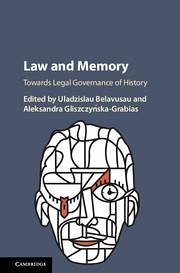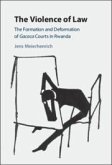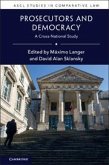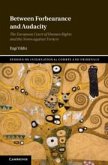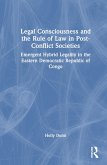Law and Memory
Herausgeber: Belavusau, Uladzislau; Gliszczy&
Law and Memory
Herausgeber: Belavusau, Uladzislau; Gliszczy&
- Gebundenes Buch
- Merkliste
- Auf die Merkliste
- Bewerten Bewerten
- Teilen
- Produkt teilen
- Produkterinnerung
- Produkterinnerung
The volume revisits memory laws as a phenomenon of global law, transitional justice, historical narratives and claims for historical truth
Andere Kunden interessierten sich auch für
![The Violence of Law The Violence of Law]() Jens MeierhenrichThe Violence of Law141,99 €
Jens MeierhenrichThe Violence of Law141,99 €![The Dawn of a Discipline The Dawn of a Discipline]() The Dawn of a Discipline146,99 €
The Dawn of a Discipline146,99 €![Foreigners on America's Death Rows Foreigners on America's Death Rows]() John QuigleyForeigners on America's Death Rows124,99 €
John QuigleyForeigners on America's Death Rows124,99 €![Prosecutors and Democracy Prosecutors and Democracy]() Prosecutors and Democracy128,99 €
Prosecutors and Democracy128,99 €![Between Forbearance and Audacity Between Forbearance and Audacity]() Ezgi YildizBetween Forbearance and Audacity125,99 €
Ezgi YildizBetween Forbearance and Audacity125,99 €![Legal Consciousness and the Rule of Law in Post-Conflict Societies Legal Consciousness and the Rule of Law in Post-Conflict Societies]() Holly DunnLegal Consciousness and the Rule of Law in Post-Conflict Societies161,99 €
Holly DunnLegal Consciousness and the Rule of Law in Post-Conflict Societies161,99 €![Civil Society and Memory in Postwar Germany Civil Society and Memory in Postwar Germany]() Jenny WüstenbergCivil Society and Memory in Postwar Germany27,99 €
Jenny WüstenbergCivil Society and Memory in Postwar Germany27,99 €-
-
-
The volume revisits memory laws as a phenomenon of global law, transitional justice, historical narratives and claims for historical truth
Produktdetails
- Produktdetails
- Verlag: Cambridge University Press
- Seitenzahl: 458
- Erscheinungstermin: 29. November 2017
- Englisch
- Abmessung: 240mm x 164mm x 28mm
- Gewicht: 771g
- ISBN-13: 9781107188754
- ISBN-10: 110718875X
- Artikelnr.: 48250837
- Herstellerkennzeichnung
- Libri GmbH
- Europaallee 1
- 36244 Bad Hersfeld
- gpsr@libri.de
- Verlag: Cambridge University Press
- Seitenzahl: 458
- Erscheinungstermin: 29. November 2017
- Englisch
- Abmessung: 240mm x 164mm x 28mm
- Gewicht: 771g
- ISBN-13: 9781107188754
- ISBN-10: 110718875X
- Artikelnr.: 48250837
- Herstellerkennzeichnung
- Libri GmbH
- Europaallee 1
- 36244 Bad Hersfeld
- gpsr@libri.de
Acknowledgements; Contributors; Introduction: memory laws: mapping a new subject in comparative law and transitional justice Uladzislau Belavusau and Aleksandra Gliszcy
ska-Grabias; Part I. International Law: 1. The UN Human Rights Committee's view of the past Antoon De Baets; 2. The role of international criminal tribunals in shaping the historical accounts of genocides Marina Aksenova; 3. The 'right to truth' in international law: the 'last utopia'? Patricia Naftali; Part II. European Law (Council of Europe and European Union): 4. Kononov vs Latvia as the ontological security struggle over remembering the Second World War Maria Mälksoo; 5. Testing the 'uniqueness': denial of the Holocaust vs denial of other crimes before the European Court of Human Rights Paolo Lobba; 6. Legislating history: the European Union and the denial of international crimes Luigi Cajani; Part III. National Perspectives within European Union: 7. Challenging historical facts and national truths: an analysis of cases from France and Greece Ioanna Tourkochoriti; 8. Legal silences and the memory of Francoism in Spain Alfons Aragoneses; 9. Politics of public knowledge in dealing with the past: postcommunist experiences and some lessons from the Czech Republic Ji
í P
ibá
; 10. Adjudication in deportation cases of Latvia and international law Ieva Miluna; 11. Judging the conduc
tor: fascism, communism and legal discontinuity in post-war Romania Cosmin Sebastian Cercel; 12. Dealing with the past in and around the fundamental law in Hungary Miklós Könczöl; 13. On the politics of resentment, mis-memory and constitutional fidelity. The demise of the Polish overlapping consensus? Tomasz Tadeusz Koncewicz; Part IV. Perspectives beyond European Union: 14. Defending Stalinism by means of criminal law: Russia, 1995-2014 Nikolay Koposov; 15. Cutting the umbilical cord: the narrative of the national past and future in Ukrainian de-communization policy Lina Klymenko; 16. Banning genocide denial - should geography matter? Robert A. Kahn; 17. 'From banning Nakba to bridging narratives': the collective memory of 1948 and transitional justice for Israelis and Palestinians Jeremie Bracka; 18. Historical revisionism and the settler state: the Canadian experience Michael Morden; 19. Defense of democracy and the preservation of collective memory through criminal legislation: the challenges of reconciliation in Peru Salvador Herencia Carrasco; Epilogue: beyond 'memory laws': towards a general theory of law and historical discourse Eric Heinze; Index.
ska-Grabias; Part I. International Law: 1. The UN Human Rights Committee's view of the past Antoon De Baets; 2. The role of international criminal tribunals in shaping the historical accounts of genocides Marina Aksenova; 3. The 'right to truth' in international law: the 'last utopia'? Patricia Naftali; Part II. European Law (Council of Europe and European Union): 4. Kononov vs Latvia as the ontological security struggle over remembering the Second World War Maria Mälksoo; 5. Testing the 'uniqueness': denial of the Holocaust vs denial of other crimes before the European Court of Human Rights Paolo Lobba; 6. Legislating history: the European Union and the denial of international crimes Luigi Cajani; Part III. National Perspectives within European Union: 7. Challenging historical facts and national truths: an analysis of cases from France and Greece Ioanna Tourkochoriti; 8. Legal silences and the memory of Francoism in Spain Alfons Aragoneses; 9. Politics of public knowledge in dealing with the past: postcommunist experiences and some lessons from the Czech Republic Ji
í P
ibá
; 10. Adjudication in deportation cases of Latvia and international law Ieva Miluna; 11. Judging the conduc
tor: fascism, communism and legal discontinuity in post-war Romania Cosmin Sebastian Cercel; 12. Dealing with the past in and around the fundamental law in Hungary Miklós Könczöl; 13. On the politics of resentment, mis-memory and constitutional fidelity. The demise of the Polish overlapping consensus? Tomasz Tadeusz Koncewicz; Part IV. Perspectives beyond European Union: 14. Defending Stalinism by means of criminal law: Russia, 1995-2014 Nikolay Koposov; 15. Cutting the umbilical cord: the narrative of the national past and future in Ukrainian de-communization policy Lina Klymenko; 16. Banning genocide denial - should geography matter? Robert A. Kahn; 17. 'From banning Nakba to bridging narratives': the collective memory of 1948 and transitional justice for Israelis and Palestinians Jeremie Bracka; 18. Historical revisionism and the settler state: the Canadian experience Michael Morden; 19. Defense of democracy and the preservation of collective memory through criminal legislation: the challenges of reconciliation in Peru Salvador Herencia Carrasco; Epilogue: beyond 'memory laws': towards a general theory of law and historical discourse Eric Heinze; Index.
Acknowledgements; Contributors; Introduction: memory laws: mapping a new subject in comparative law and transitional justice Uladzislau Belavusau and Aleksandra Gliszcy
ska-Grabias; Part I. International Law: 1. The UN Human Rights Committee's view of the past Antoon De Baets; 2. The role of international criminal tribunals in shaping the historical accounts of genocides Marina Aksenova; 3. The 'right to truth' in international law: the 'last utopia'? Patricia Naftali; Part II. European Law (Council of Europe and European Union): 4. Kononov vs Latvia as the ontological security struggle over remembering the Second World War Maria Mälksoo; 5. Testing the 'uniqueness': denial of the Holocaust vs denial of other crimes before the European Court of Human Rights Paolo Lobba; 6. Legislating history: the European Union and the denial of international crimes Luigi Cajani; Part III. National Perspectives within European Union: 7. Challenging historical facts and national truths: an analysis of cases from France and Greece Ioanna Tourkochoriti; 8. Legal silences and the memory of Francoism in Spain Alfons Aragoneses; 9. Politics of public knowledge in dealing with the past: postcommunist experiences and some lessons from the Czech Republic Ji
í P
ibá
; 10. Adjudication in deportation cases of Latvia and international law Ieva Miluna; 11. Judging the conduc
tor: fascism, communism and legal discontinuity in post-war Romania Cosmin Sebastian Cercel; 12. Dealing with the past in and around the fundamental law in Hungary Miklós Könczöl; 13. On the politics of resentment, mis-memory and constitutional fidelity. The demise of the Polish overlapping consensus? Tomasz Tadeusz Koncewicz; Part IV. Perspectives beyond European Union: 14. Defending Stalinism by means of criminal law: Russia, 1995-2014 Nikolay Koposov; 15. Cutting the umbilical cord: the narrative of the national past and future in Ukrainian de-communization policy Lina Klymenko; 16. Banning genocide denial - should geography matter? Robert A. Kahn; 17. 'From banning Nakba to bridging narratives': the collective memory of 1948 and transitional justice for Israelis and Palestinians Jeremie Bracka; 18. Historical revisionism and the settler state: the Canadian experience Michael Morden; 19. Defense of democracy and the preservation of collective memory through criminal legislation: the challenges of reconciliation in Peru Salvador Herencia Carrasco; Epilogue: beyond 'memory laws': towards a general theory of law and historical discourse Eric Heinze; Index.
ska-Grabias; Part I. International Law: 1. The UN Human Rights Committee's view of the past Antoon De Baets; 2. The role of international criminal tribunals in shaping the historical accounts of genocides Marina Aksenova; 3. The 'right to truth' in international law: the 'last utopia'? Patricia Naftali; Part II. European Law (Council of Europe and European Union): 4. Kononov vs Latvia as the ontological security struggle over remembering the Second World War Maria Mälksoo; 5. Testing the 'uniqueness': denial of the Holocaust vs denial of other crimes before the European Court of Human Rights Paolo Lobba; 6. Legislating history: the European Union and the denial of international crimes Luigi Cajani; Part III. National Perspectives within European Union: 7. Challenging historical facts and national truths: an analysis of cases from France and Greece Ioanna Tourkochoriti; 8. Legal silences and the memory of Francoism in Spain Alfons Aragoneses; 9. Politics of public knowledge in dealing with the past: postcommunist experiences and some lessons from the Czech Republic Ji
í P
ibá
; 10. Adjudication in deportation cases of Latvia and international law Ieva Miluna; 11. Judging the conduc
tor: fascism, communism and legal discontinuity in post-war Romania Cosmin Sebastian Cercel; 12. Dealing with the past in and around the fundamental law in Hungary Miklós Könczöl; 13. On the politics of resentment, mis-memory and constitutional fidelity. The demise of the Polish overlapping consensus? Tomasz Tadeusz Koncewicz; Part IV. Perspectives beyond European Union: 14. Defending Stalinism by means of criminal law: Russia, 1995-2014 Nikolay Koposov; 15. Cutting the umbilical cord: the narrative of the national past and future in Ukrainian de-communization policy Lina Klymenko; 16. Banning genocide denial - should geography matter? Robert A. Kahn; 17. 'From banning Nakba to bridging narratives': the collective memory of 1948 and transitional justice for Israelis and Palestinians Jeremie Bracka; 18. Historical revisionism and the settler state: the Canadian experience Michael Morden; 19. Defense of democracy and the preservation of collective memory through criminal legislation: the challenges of reconciliation in Peru Salvador Herencia Carrasco; Epilogue: beyond 'memory laws': towards a general theory of law and historical discourse Eric Heinze; Index.

